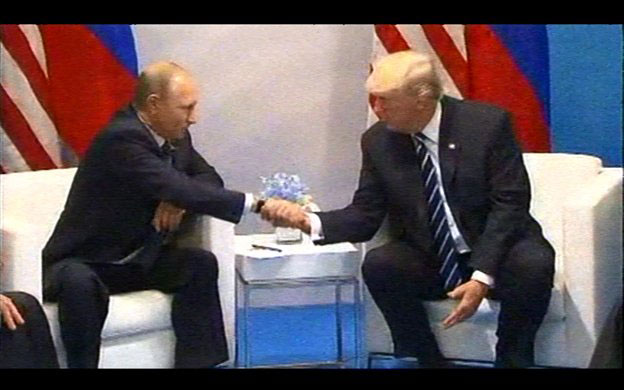
Washington, United States | AFP | Explosive allegations that US President Donald Trump concealed conversations with Russia have thrown an unwelcome spotlight on interpreters, whose quick wit is vital to diplomacy and who stay scrupulously in the shadows.
Interpreters, whether they are working at high-stakes international summits or in low-level court hearings, abide by a code of ethics not to divulge anything they hear.
Trump fueled suspicions about his ties with Russia when, in a sharp break with standard diplomatic practice, he dismissed top aides for two hours of talks with President Vladimir Putin during their first formal summit in July.
Only one American remained in the room in Helsinki — Marina Gross, an interpreter provided by the State Department.
House Democrats last year unsuccessfully sought to force Gross to testify about the summit, saying Trump’s extraordinary actions required extraordinary measures in turn.
Reviving concerns, The Washington Post reported that Trump snatched her notes after an earlier encounter with Putin in 2017 on the sidelines of a Group of 20 summit in Hamburg and instructed Gross not to discuss the conversation even with other administration officials.
“It’s actually unprecedented that we are in the spotlight as much as we are now,” said Uros Peterc, president of the Geneva-based International Association of Conference Interpreters.
Peterc, who quipped that his was the world’s second-oldest profession, said that non-disclosure of conversations was the paramount principle of interpreters.
“It’s been clear since forever that an interpreter is somebody the principal has full and total trust in,” said Peterc, who was part of the interpretation team in Slovenia for Putin’s summit with newly elected US president George W. Bush in 2001.
“It’s the same thing when you go to a doctor. You don’t expect the doctor to meet you on the street and say, ‘How is that cancer?'”
– Private meetings highly rare –
Trump — whose presidential campaign’s relationship with Russia is the focus of a probe by special counsel Robert Mueller — has denied secrecy about the summit and declared Monday on the snowy grounds of the White House, “I never worked for Russia.”
But even if Trump’s motivation was solely to build a chummy rapport with Putin, US presidents virtually never meet alone with foreign leaders, especially ones regarded as adversaries.
An aide — generally a senior staff member of the National Security Council or, in some cases, the secretary of state or secretary of defense — is normally taking extensive notes, said Michael Glennon, a professor of international law at The Fletcher school of Tufts University.
“The intelligence community is frequently interested in subtleties in the phraseology and insights of the other head of state,” said Glennon, former legal counsel at the Senate Foreign Relations Committee.
Diplomats are also looking closely for any potential openings, “all things that might be lost on a president speaking or listening by himself,” Glennon said.
“It would be extremely unusual for a president to cut off all other members of his administration from the substance of what is said.”
– Deciphering interpreters’ notes? –
Even more rare would be for the interpreter to be taking thorough notes.
Laura Burian, dean of the Graduate School of Translation, Interpretation and Language Education at the Middlebury Institute of International Studies, said it was doubtful that an interpreter’s notebooks would even convey much.
Interpreters rely on powerful short-term memory, seeking to remember and translate speaker’s thoughts for only a matter of seconds or minutes.
When jotting down notes, interpreters might only write down numbers or proper nouns that need to be precise, Burian said.
“Looking back at it months or even a day later, it wouldn’t reflect everything that was said in the room,” she added.
She also said interpreters have been concerned over the latest developments, although government-employed interpreters such as Gross have security clearances that could protect them.
“Since World War II when the use of interpreters became more codified, you’ve just assumed that the interpreter will never be asked to speak,” Burian said.
The United States is not the only country where interpreters have faced calls to testify.
The International Association of Conference Interpreters voiced alarm last month after authorities in Poland summoned an interpreter to learn about a conversation, also with Putin, by EU President Donald Tusk when he was the country’s prime minister.
The row on Trump has parallels to 1998, when independent counsel Ken Starr forced testimony from Secret Service agents guarding then president Bill Clinton to see if he had a dalliance with intern Monica Lewinsky, an unprecedented step that the Supreme Court refused to stop.
 The Independent Uganda: You get the Truth we Pay the Price
The Independent Uganda: You get the Truth we Pay the Price



